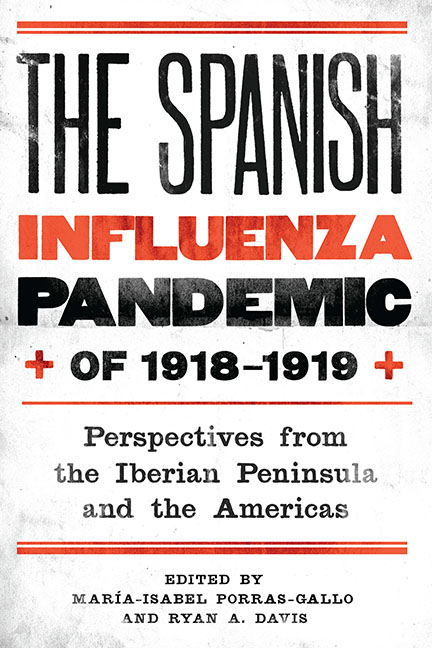 The Spanish Influenza Pandemic of 1918–1919
The Spanish Influenza Pandemic of 1918–1919 Book contents
- Frontmatter
- Dedication
- Contents
- Introduction: Emerging Perspectives of the Spanish Influenza Pandemic of 1918–19
- Part One Scientific Discourse: Now and Then
- Part Two Social Responses: Human and Institutional Actors
- 4 And to Make Things Worse, the Flu: The Spanish Influenza in a Revolutionary Portugal
- 5 Between the Pandemic and World War I: The 1918–19 Influenza Pandemic in the Spanish Army, through the Eyes of the Press
- 6 The Reign of the Spanish Flu: Impact and Responses to the 1918 Influenza Pandemic in Minas Gerais, Brazil
- 7 The Spanish Flu in Bahia, Brazil: Prophylaxis and Healing Practices
- 8 A Collaborative Experience: The Mutual Benefit Societies’ Responses to the 1918–19 Influenza Pandemic in Pamplona, Spain
- Part Three Interpreting the Epidemic: Sociocultural Dynamics and Perspectives
- Selected Bibliography
- List of Contributors
- Index
4 - And to Make Things Worse, the Flu: The Spanish Influenza in a Revolutionary Portugal
from Part Two - Social Responses: Human and Institutional Actors
Published online by Cambridge University Press: 14 March 2018
- Frontmatter
- Dedication
- Contents
- Introduction: Emerging Perspectives of the Spanish Influenza Pandemic of 1918–19
- Part One Scientific Discourse: Now and Then
- Part Two Social Responses: Human and Institutional Actors
- 4 And to Make Things Worse, the Flu: The Spanish Influenza in a Revolutionary Portugal
- 5 Between the Pandemic and World War I: The 1918–19 Influenza Pandemic in the Spanish Army, through the Eyes of the Press
- 6 The Reign of the Spanish Flu: Impact and Responses to the 1918 Influenza Pandemic in Minas Gerais, Brazil
- 7 The Spanish Flu in Bahia, Brazil: Prophylaxis and Healing Practices
- 8 A Collaborative Experience: The Mutual Benefit Societies’ Responses to the 1918–19 Influenza Pandemic in Pamplona, Spain
- Part Three Interpreting the Epidemic: Sociocultural Dynamics and Perspectives
- Selected Bibliography
- List of Contributors
- Index
Summary
In the first decades of the twentieth century, although Portuguese society was undergoing a transformation process marked by a growing population, industrialization, and urban development, the country remained predominantly rural. At the start of the decade in which the epidemic outbreak known internationally as the Spanish influenza occurred, nearly 80 percent of the population was tied to agriculture, the vast majority being small agricultural landowners and poor rural workers. In 1920, the census year closest to the pandemic, Portugal's population was 6,032,991; of this number, only 676,107 lived in the country's largest cities of Lisbon and Porto, while 4,929,365 lived in the so-called rural zones, which included smaller cities.
To reconstruct the context in which the epidemic occurred, we must include a number of facts involving the economic and social structure of Portugal, together with its political, ideological, and health and welfare domains. The establishment of a republican regime in 1910 through a revolution had alienated a segment of the population sympathetic to the monarchy. Moreover, the radical separation achieved between the church and state, following the model of the Third French Republic, was an affront to the Catholic Church. In fact, the new regime directly offended the church by attempting to impose an official lay culture of positivist inspiration by separating it from the state, by depriving the church of means and influence, by making spiritual and religious group activities subject to strict control, and by expropriating its property. Meanwhile, the republican regime, which had been fully embraced by the predominantly urban workforce, often reacted ruthlessly against social movements involving strikes. This intensified discontent with the republic's most influential parties, particularly the most important, the Democratic Party. Portugal's involvement in World War I on the side of the Allies—in which this party played a key supporting role—further divided the Portuguese, who had not faced a mass military mobilization in nearly a century. Among various social groups, particularly the monarchists, sympathy for the cause of the empires against which Portugal fought was notorious.
As noted in the introduction to this volume, the wartime circumstances also aggravated situations of hunger, food shortages, and the cost of living, with mounting social and political conflicts, including assaults on warehouses and establishments for essential needs in May 1917.
- Type
- Chapter
- Information
- The Spanish Influenza Pandemic of 1918–1919Perspectives from the Iberian Peninsula and the Americas, pp. 75 - 92Publisher: Boydell & BrewerPrint publication year: 2014


